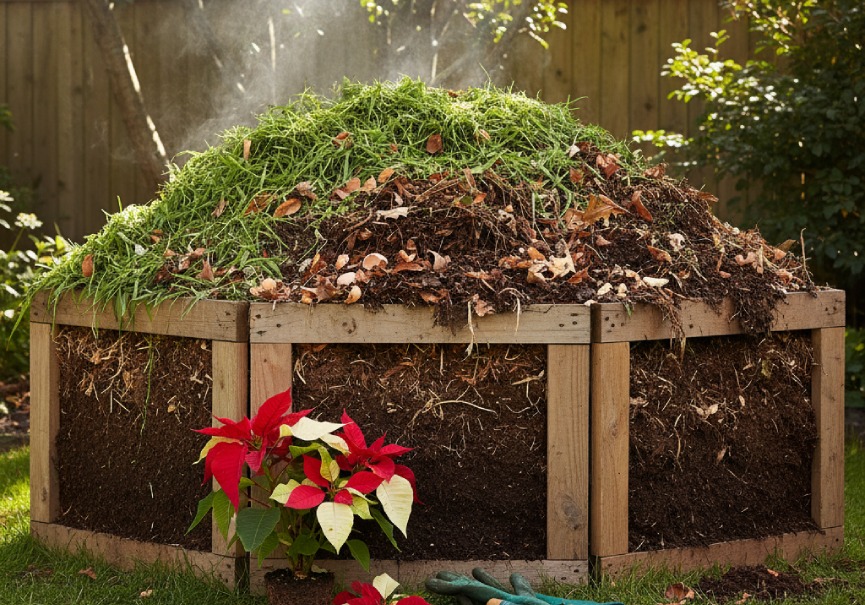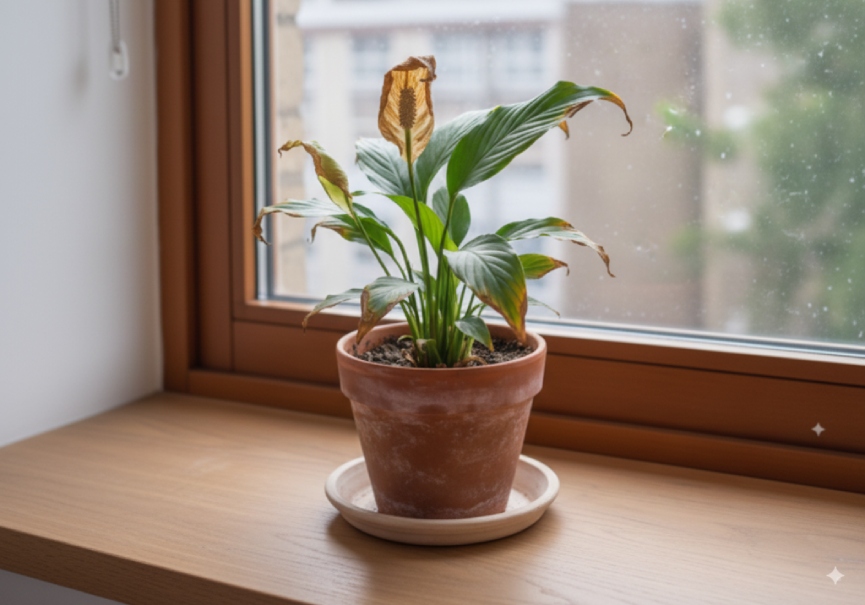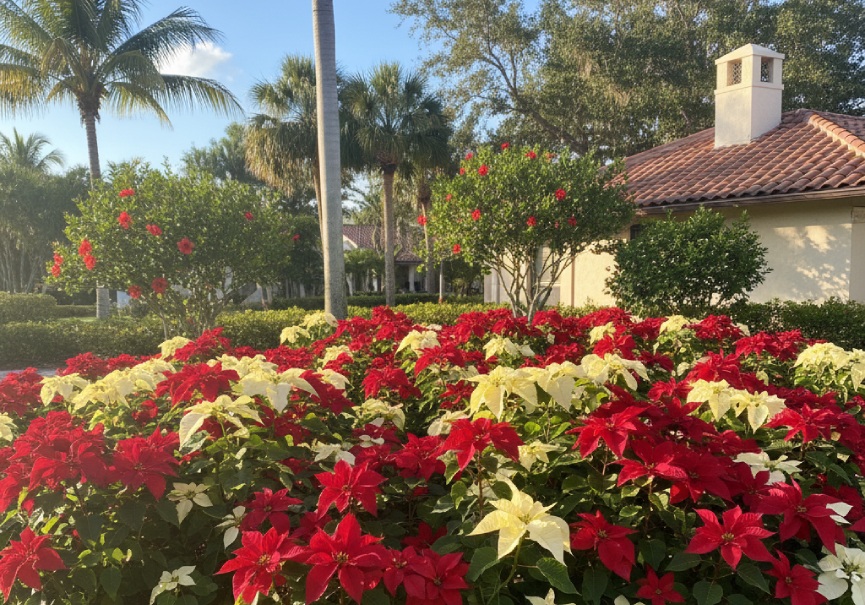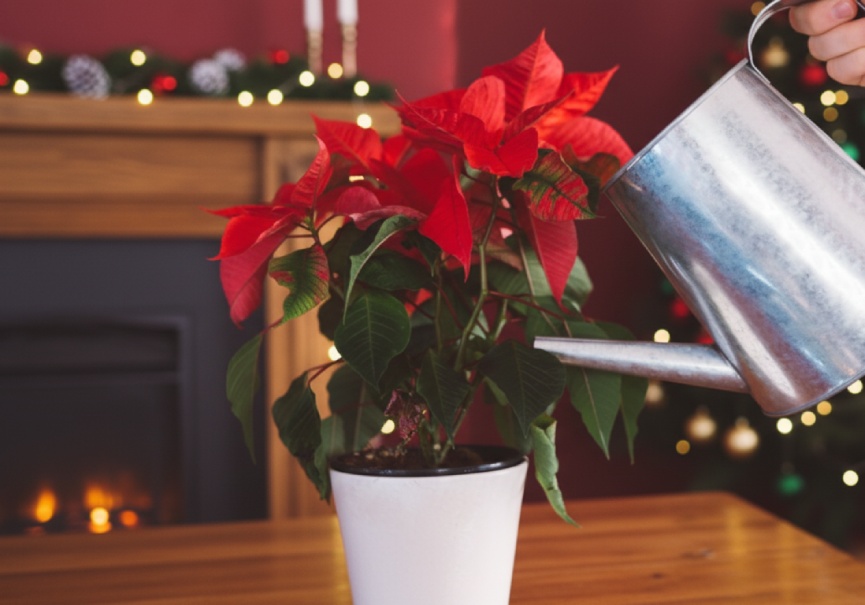Can You Compost Poinsettias? Exploring Sustainable Options for Festive Plant Disposal

Introduction
Poinsettias, with their colourful and festive presence, have long been loved as holiday decorations and presents, infusing warmth and shade into our homes at some stage in the festive season. As the vacation fervor subsides and the poinsettias gracefully transition from their height, a not-unusual query arises: Can you compost poinsettias? This query delves into the area of sustainable gardening practices, offering a risk to explore the possibilities of giving those soon-to-be-superb plants a new life beyond the vacations. Understanding the art of composting poinsettias involves not only the best environmental issues, but additionally a grasp of proper strategies to ensure a continuing integration into the natural recycling processes of your garden. In this article, we will resolve the nuances of composting poinsettias and discover how to show their colourful beauty into nourishment for your lawn’s future growth.
Composting Fundamentals: Nurturing Nature’s Recycling
Let’s talk about composting in a really simple way! Composting is like nature’s way of recycling. It takes things like food scraps and leaves and turns them into super-nutritious soil. This is done by tiny living things that break down the stuff.
So, when we have things like kitchen scraps, grass, and plants that we don’t need anymore, we can put them in a special pile to make compost. But we have to make sure we have the right mix of different things. There are the “greens,” which are things like food scraps and grass, and the “browns,” which are things like leaves and paper. Getting the right balance of greens and browns helps the compost break down well and not smell bad.
Now, these tiny living things that break things down need a bit of help to do their job. They like the pile to be warm, not too wet or too dry, and they need some air. All of this helps them work faster and better.
But when we want to compost things like poinsettias, there are some things to think about. Poinsettias can be composted, but they have a special substance in them that can make it a bit tricky for the tiny living things to break them down. Also, some people might be sensitive to poinsettias, so we need to be careful. To make it work well, we can cut the poinsettias into smaller pieces and mix them with other compostable things. This way, everything can break down together nicely.
So, when we look closely at composting poinsettias, we see that it’s a good way to get rid of these holiday plants in a responsible and useful way.
Composting Poinsettias: Challenges and Considerations
Figuring Out Why Poinsettias Are Tricky to Compost. Poinsettias aren’t like regular stuff you put in compost. They have this gooey stuff called latex in their leaves and stems that makes things a bit complicated. This latex can slow down the process of breaking them down and make clumps in the compost pile. Also, some people might react to certain things in poinsettias if they’re sensitive to them.
Taking Your Time with Breakdown Poinsettias don’t break down as fast as other things in compost. This is because their structure is tough, and the latex inside them makes things slower. So, if you’re composting poinsettias, you need to be patient. Give them the right conditions and wait for them to turn into good compost.
Tricks for Success: Cutting and Mixing. To deal with the latex and slow breakdown, there are two good ways to make things work better. First, you can cut the poinsettias into small pieces. This helps the tiny things that break them down get to more parts of them. Second, mix the cut-up poinsettias with other compostable stuff, like kitchen scraps and yard waste. This makes sure there’s a good mix of things that break down fast and slow, and it creates a nice place for composting.
Helping the Earth: Facing Challenges for Good. Even though composting poinsettias has some tough parts, don’t forget the big picture. By dealing with these challenges, we can turn these holiday plants into awesome stuff for our gardens. If we get ready, stay patient, and really care about taking care of our environment, we can handle the hard stuff and make sure our poinsettias go away in a nice and Earth-friendly way.
Preparing Poinsettias for Composting: A Step-by-Step Guide
Step 1: Take Out the Not-Natural Stuff. Before you put poinsettias in the compost, make sure you’ve taken off anything that’s not natural. This means things like decorations, ribbons, or stuff that doesn’t break down. Those things can mess up how the compost works and stop the little living things from doing their job.
Step 2: Cut and Trim. To help the composting, cut the poinsettia plant into smaller parts. Get rid of big branches or stems that might take a long time to break down. When the plant is in smaller pieces, the tiny living things can do their job better.
Step 3: Make It Small. Because poinsettias have that sticky latex, it’s smart to cut up the leaves and stems into even smaller bits. This helps break down the latex, and it makes sure the plant mixes well with the rest of the compost. Cutting things up stops big lumps from forming.
Step 4: Mix. Poinsettias break down slowly, but you can make it faster by mixing them with other things that compost well. Put the tiny pieces of poinsettias in with other stuff that’s good for compost, like kitchen scraps and leaves. Mixing things right is important for making good compost.
By doing these steps, you can get your poinsettias ready for composting. Pay attention to the details and keep doing the composting process right. This way, you’ll change these holiday plants into really good soil that helps gardens grow, and you’ll be a part of making gardening better for the Earth.
Composting Process and Timeline: From Poinsettias to Nutrient-Rich Soil
Stage 1: Getting Started with Breakdown Once you’ve prepared your poinsettias and added them to the compost pile, things begin changing. Tiny living things start breaking down the plant pieces, and as they work, they make heat. It’s important to turn the compost pile sometimes to make sure heat, air, and water are spread evenly. This helps the breakdown happen faster and better.
Stage 2: Microbes at Work and Temperature Rise As the tiny living things keep doing their job, the compost pile gets hotter. This heat helps break down the poinsettias even more, especially the parts with latex. Checking the temperature of the pile helps you see if everything is going well with the composting.
Stage 3: Getting Older and Settling Down. With time, the compost pile gets older and changes. The poinsettia parts you put in start to mix with the other stuff in there. The pile’s temperature stops going up so much, showing that the busy part of breaking things down is almost done. Depending on how things are going, this step can take a few weeks to a few months.
Stage 4: Ready to Use. When the composting is almost done, the stuff in the pile turns into something dark and crumbly called humus. The poinsettias have now turned into really good compost that’s full of nutrients. You can put this compost in your garden soil to make it better. It helps plants grow by keeping water in the soil and giving them the food they need.
Timing Variability
Remember that the time it takes to compost poinsettias can be different for everyone. It depends on things like what’s in the compost, the environment, and how the poinsettia parts are. Some people might get good compost in a few weeks, while others might have to wait a few months for the best results. Being patient is really important while you let nature do its work to recycle things.
As you go through these composting steps, you’ll see poinsettias change from holiday plants into great stuff for the soil. Knowing how things work and how long they might take helps you take care of your compost pile the right way. It also helps you choose the best time to use the awesome compost you’ve made in your garden. This way, you can feel good about doing something good for the Earth!
Benefits of Composting Poinsettias: Enriching Soil and Nurturing Sustainability
Pruning Poinsettias into an incredible garden assists
Composting poinsettias is an extraordinary thing to do, and it comes with notable rewards. These special plant life smash down and turn out to be a kind of outstanding soil that’s complete of the right things for your garden. After they break down, they supply the compost with crucial stuff like nitrogen, phosphorus, and potassium. Whilst you put this compost for your lawn, it makes your plants grow better, facilitates the soil to live sturdily, and makes a nice environment for the plant life.
Helping the environment by reducing Trash
While you compost poinsettias, you’re also doing something absolutely exact for the Earth. In case you throw these plants inside the everyday trash, they end up in massive garbage regions known as landfills. However, once they break down there, they make gases that are bad for the environment. Composting poinsettias as a substitute keeps them out of the landfill and makes things better for the planet.
Creating a Smaller impact in the world
Composting is also about being more Earth-friendly. When poinsettias decompose in a landfill, they make a gas called methane. This is not the top for the weather. Composting them is higher due to the fact that they break down in a way that does not produce a lot of methane. That is a way to assist in keeping the Earth greener and safer.
Connecting everything in Gardening
Composting poinsettias is like completing a circle in nature. You turn this plant life into compost, which then allows your destiny plants to grow. It is like taking care of your garden and the Earth at the same time. This kind of gardening makes you much less dependent on chemicals and makes your lawn a glad part of the environment.
While you compost poinsettias, you are doing something surely wonderful for the planet and your garden. via taking care of nature, you are making an awesome impact that is going beyond simply the holiday season.
Alternative Disposal Methods: Exploring Creative Ways to Bid Farewell to Poinsettias
Making humans satisfied: share with Gardens and schools
think about giving your poinsettias to gardens or colleges close by. They may make humans glad. They make others sense proper, and schools can use them for studying. When you provide poinsettias, you are not just making happiness unfold, but additionally assisting your network and displaying how to take care of nature.
Bringing splendor outdoors: maintaining them pretty
If your region has a good climate, you can plant poinsettias outside. They may continue developing and looking high-quality all year. Just deal with them and examine what they need before you plant them.
Having fun with Crafts: creating Cool matters
Use your creativity to make fun matters with poinsettias. Dry the leaves and flowers to make wreaths, pretty bowls, or even art. This way, you could keep the holiday feeling going even after the holidays are completed. It’s a fun way to use poinsettias in different ways and show that you care about the Earth.
Trying these ideas lets you do more with your poinsettias. With the aid of giving, planting, or making matters, you are being innovative and assisting the environment by no longer wasting them. It’s a way to make the world a better place.
Conclusion
Composting poinsettias is an environmentally responsible way to dispose of these festive plants after the holiday season. By properly preparing the plants and following composting best practices, you can transform them into nutrient-rich soil amendments that benefit your garden and the environment.
FAQ
1. Can I compost poinsettias with other kitchen waste? Ans:- Yes, poinsettias can be composted alongside other kitchen waste, but ensure a proper balance of greens and browns.
2. Is it safe to compost poinsettias that have been treated with pesticides? Ans:- It’s best to avoid composting plants treated with pesticides, as the chemicals could persist in the compost.
3. Can I compost poinsettia pots? Ans:- Composting pots made of natural materials like clay or coconut coir is usually fine. However, plastic pots should not be composted.
4. Can I compost poinsettias in a small backyard compost bin? Ans:- Yes, poinsettias can be composted in a backyard compost bin as long as you follow proper composting practices.
5. How long does it take for poinsettias to compost? Ans:- The time it takes for poinsettias to compost depends on factors like the size of the plant, the composting conditions, and the composting method used. It can take several weeks to several months.






